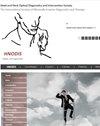Prevalence and Pattern of Cervical Nodal Metastasis of Upper Aerodigestive Tract Squamous at the Time of Diagnosis in Patients Attending Tikur Anbessa Hospital from September 2015 to September 2020
Head and Neck Optical Diagnostics Society
Pub Date : 2021-11-05
DOI:10.26420/austinheadneckoncol.2021.1012
引用次数: 0
Abstract
Background: UADT neoplasms is a heterogenous diseases entity, which includes primaries arising from nose and paranasal sinuses, nasopharynx, oral cavity, oropharynx, hypopharynx and larynx. Squamous cell carcinoma is the predominant histologic type. The likelihood of having nodal diseases at presentation may have a wide range depending the size and site of the primary tumor with significantly higher risk for patients with nasopharyngeal primaries and advanced T stage of other sub-sites of upper aerodigestive tract. Chances of having multiple and bilateral nodes also have direct correlation with the size of the primary tumors. Positive cervical nodal status is one of the most reliable prognostic factors which drops cure rate significantly. It is also responsible for treatment failure, local recurrence and reduction of survival rate and its a reliable indicator of development of distant metastasis. The pattern of distribution of nodal involvement is different for each site. Thorough study of distribution of most likely involved lymph node levels for each sub site helps to customize the neck treatment accordingly by avoiding radical treatments with significant functional and aesthetic morbidity. Objective: To define prevalence and pattern of nodal and distant metastasis of UADT-SCC patients at the time of diagnosis. Methods: Institution based retrospective cross sectional medical chart review of patients from September 2015- September 2020 was conducted. 259 patients who fulfilled the inclusion criteria were selected using systematic random sampling technique and data was collected using questioner. Results: A total of 259 medical records were reviewed. Mean age at presentation is 44.8. Male to female ratio is 2.6:1. Prevalence of positive nodal diseases at presentation is 71%. Site-specific analysis showed 50% of nose and PNS, 86.1% nasopharyngeal, 73.2% oral cavity, 70% oropharyngeal, 66.7% hypo-pharyngeal and 57.2% laryngeal primaries had positive nodal diseases at presentation. Majority of late presentations had positive nodal diseases (p<0.05). Nasopharynx is the commonest site of primary tumor (30.5%). It is also the commonest site with higher percentage of positive nodal dis- eases (86.1%). Most patients had advanced stage at presentation (cTNM stage III and IV- 88.1%). Distant metastasis was found in 10.8% of patients and had strong association with T stage (p<0.05). Conclusion and Recommendation: This study concluded that majority of patients fall in the age group of 31 to 40 with male predominance of 2.6 to 1. Late presentation is a rule since most patients with UADT-SCC has advanced disease at presentation with significant nodal neck diseases. Nasopharynx is the commonest site of primary tumor for both males and females. It’s also the commonest site of primaries with higher percentage of positive nodal diseases at presentation. Chances of having positive cervical nodal disease at presentation were very high in patients with advanced T diseases. Pattern of metastasis of most sites are inline with the current accepted knowledge of practice. Research designs with better strength should be used to study the clinicopathologic behavior of UADT-SCC both nationwide and in region specific setups. Institutional cancer registry should be improved and made easily accessible to researchers. Patient’s medical records should be complete. Policies on preventive measures and screening tools should be designed.2015年9月至2020年9月在提库尔安贝萨医院就诊的患者诊断时上气消化道鳞状宫颈淋巴结转移的患病率及类型分析
背景:UADT肿瘤是一种异质性疾病,包括原发于鼻和鼻窦、鼻咽部、口腔、口咽部、下咽和喉。鳞状细胞癌是主要的组织学类型。根据原发肿瘤的大小和部位的不同,首发时发生淋巴结疾病的可能性可能有很大的范围,鼻咽部原发和上消化道其他亚部位的晚期T期患者的风险明显更高。多发和双侧淋巴结的可能性也与原发肿瘤的大小直接相关。宫颈结阳性是降低治愈率最可靠的预后因素之一。它也是治疗失败、局部复发和生存率降低的原因,也是远处转移发展的可靠指标。每个部位的淋巴结分布模式是不同的。深入研究每个亚部位最可能受损伤的淋巴结水平的分布,有助于相应地定制颈部治疗,避免造成显著功能和美学损害的根治性治疗。目的:明确UADT-SCC患者在诊断时淋巴结和远处转移的患病率和模式。方法:对2015年9月- 2020年9月住院患者进行回顾性横断面病历回顾。采用系统随机抽样方法选取符合纳入标准的患者259例,采用问卷调查法收集资料。结果:共审查病历259份。平均发病年龄为44.8岁。男女比例为2.6:1。发病时淋巴结阳性的患病率为71%。部位特异性分析显示,50%的鼻部和PNS、86.1%的鼻咽、73.2%的口腔、70%的口咽、66.7%的下咽和57.2%的喉原发灶在就诊时呈淋巴结阳性。多数晚期患者有淋巴结病变阳性(p<0.05)。鼻咽部是原发肿瘤最常见的部位(30.5%)。它也是最常见的部位,阳性淋巴结疾病的比例较高(86.1%)。大多数患者在就诊时为晚期(cTNM III期和IV期- 88.1%)。远端转移发生率为10.8%,与T分期密切相关(p<0.05)。结论与建议:本研究认为,患者以31 ~ 40岁年龄组为主,男性占比为2.6:1。由于大多数UADT-SCC患者在出现明显的淋巴结颈部疾病时病情已进展,因此晚期出现是一个规则。鼻咽部是男性和女性最常见的原发肿瘤。它也是最常见的原发部位,呈现时阳性淋巴结疾病的比例较高。晚期T疾病患者在就诊时宫颈结病阳性的几率非常高。大多数部位的转移模式符合目前公认的实践知识。应采用较强的研究设计来研究UADT-SCC的临床病理行为,无论是在全国范围内还是在特定地区。机构癌症登记应得到改进,并使研究人员容易获得。病人的医疗记录应该完整。应设计有关预防措施和筛查工具的政策。
本文章由计算机程序翻译,如有差异,请以英文原文为准。
求助全文
约1分钟内获得全文
求助全文

 求助内容:
求助内容: 应助结果提醒方式:
应助结果提醒方式:


